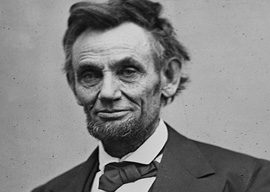
April 25, 2011

Abraham Lincoln
In what may be described as the Dell comic-book version of “the Civil War’s true beginning,” Allen C. Guelzo, seated as Henry R. Luce Professor of the Civil War Era at Gettysburg College (I”ll bet my hat that the neocons are paying for this oddly named chair), explains in the New York Post what really happened at Fort Sumter 150 years ago. According to Guelzo, the Great Emancipator maneuvered the Southerners into taking the federal fort in Charleston Harbor in order to push us into a morally redemptive war made necessary because the Southern “slave states” were a threat to democracy everywhere:
The newly minted Confederacy was only worried about preserving slavery and the stiffly ranked society slavery created”but in Lincoln’s mind the issue was larger: Secession was anarchy”and no friend of democracy.
Apparently Lincoln was agonizing over democracy’s future in general. He knew full well that in Europe “struggles for democracy had been snuffed out by kings, emperors and dictators of various sorts.” To make matters worse, allowing the South to leave the Union would strengthen anti-democracy in the Old World:
If the American democracy shattered itself because seven states weren’t willing to abide by the outcome of the presidential election, then every one of those kings, emperors and dictators would be able to say to their nations, “See what democracy gets you? Instability. Disorder….”
Let’s see if I understand Guelzo’s picture of nineteenth-century history: Victoria in England, Victor Emmanuel in the nascent Italian kingdom, Franz Josef in Austria, and all their fellow monarchs were just waiting for the South to win its independence in order to shout to their subjects: “We told you so! That’s what democracy gets you.” Somehow Lincoln’s more gruesome accomplishments after he created a casus belli at Sumter”such as getting 636,000 young Americans mowed down in battle and many more permanently maimed and signing off on Sherman’s deliberate devastation of Georgia and South Carolina”would serve to dispel any lingering doubt about democratic government’s beneficence. All the carnage would prove to everyone in Europe that democracies are peaceful and that their subjects get along swimmingly well.
Equally questionable is Guelzo’s assumption that European monarchs took the South’s side against the “democratic” North. The most reactionary European power, Russia, was solidly allied to the Union side, as was Bismarck’s Prussia. In return Lincoln sided with Russian suppression of the 1863 Polish uprising against Russian occupation. Perhaps to their credit, President Lincoln and Secretary of State James Seward did not seem as driven as our modern “conservative” movement is to create democracy everywhere on Earth.
Guelzo sounds even more infantile when he describes Europe in the 1860s. Most Western European countries had by then developed or were developing constitutional governments in which the rising bourgeoisie played leading roles. France was under an authoritarian but not particularly repressive government run by Louis Napoleon, who was opening his regime more and more to civil liberties. By 1867 England and the North German Confederation under Bismarck’s leadership had nearly universal suffrage for male citizens. Other Northern European countries such as Belgium and Holland were moving rapidly in the same direction.
Interestingly, the February 1861 Patent issued by Franz Josef establishing a unified parliament for his empire unleashed some of the same tensions that were at work in the United States. The regional governments, which were in the hands of the magnates and ethnic minorities, opposed the Patent’s centralizing tendencies. They lived on the land and had stronger regional ties than national ones. But the professional and merchant classes advocated a constitutional parliamentary regime, which also included the supporters of a unified German nation (under Austrian rule). The centralizers, who were mostly bourgeois, were enthusiastic nationalists and favored a consolidated state power. In some ways, the American Civil War was not the exception but a particularly bloody manifestation of what was then a common struggle. What makes the American case stand out was its brutality”the way regional agrarian powers were defeated and the humiliation inflicted on them during and after the conflict. Apparently it was not enough to please Guelzo, Victor Davis Hanson, and other ghoulish neocons who salivate at the idea of all the suffering visited on the “slave class.” Unfortunately for this argument, most of those who fought for Southern independence did not own slaves, while Northern commanders such as McClellan and Grant did.